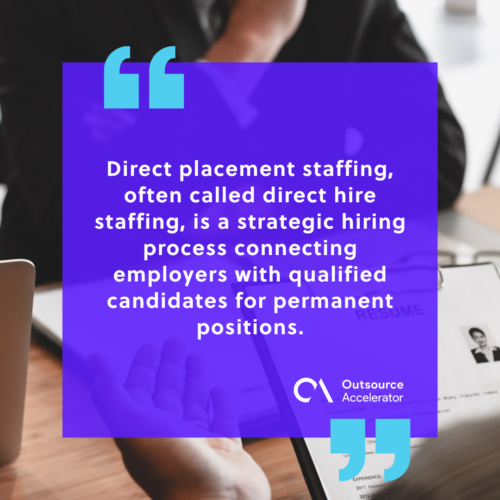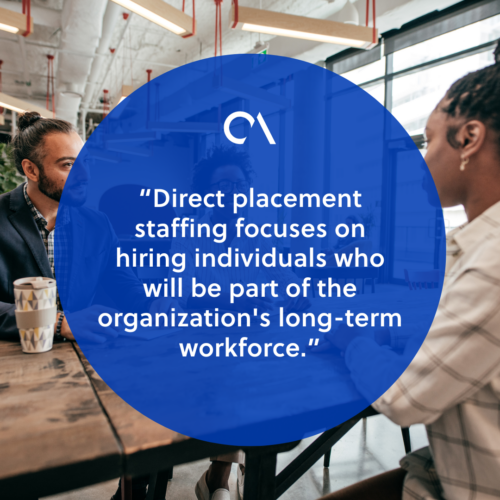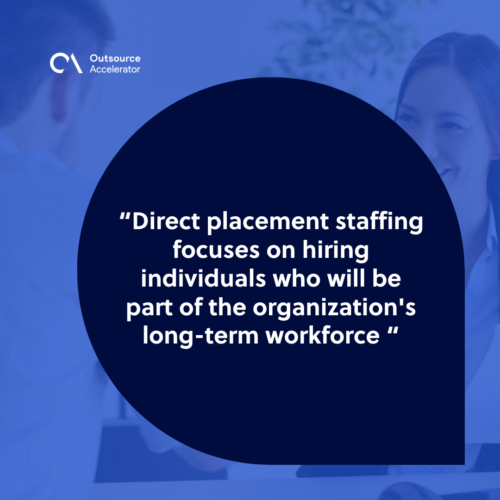Understanding the concept of direct placement staffing

As businesses strive for excellence, the need to swiftly and effectively identify and secure the best candidates is paramount. Direct placement staffing agencies specialize in this task, leveraging their expertise and networks to connect employers with exceptional talent.
This approach helps prevent high turnover rates and ensures long-term employee satisfaction, a critical factor in today’s employee-driven job market.
This article explores the concept of direct placement staffing, its importance, and how it compares to other staffing models. We’ll also delve into its potential drawbacks and highlight its benefits to employers and job seekers.
What is direct placement staffing?
Direct placement staffing, often called direct hire staffing, is a strategic hiring process connecting employers with qualified candidates for permanent positions.
Direct placement aims to find the perfect match right from the start. In this staffing model, candidates are hired directly by the employer, skipping the intermediary stages.
Staffing agencies play an essential role in this process. They act as talent scouts, diligently sourcing, screening, and presenting candidates to organizations needing permanent employees.
Once suitable candidates are identified and hired, they become integral to the client company’s workforce—with no initial trial period or temporary status.

Importance of staffing solutions
Staffing solutions are the lifeblood of any organization, as they directly impact the quality and efficiency of the workforce.
Effective staffing solutions, such as direct placement, can transform a company’s recruitment process from a mere task to a strategic advantage.
By entrusting the responsibility to experts, businesses can focus on their core operations while being confident that they are making informed, reliable hiring decisions.
Direct placement staffing vs. Other staffing models
To fully appreciate direct placement staffing, it’s essential to understand how it stacks up against other common staffing models.
Let’s explore the key differences between direct placement, temporary, temp-to-hire, contract, and permanent staffing.
Direct placement staffing vs.Temporary staffing
Temporary staffing involves hiring employees for a predetermined duration to address seasonal or project-based employment needs. Temporary employees are typically not considered permanent members of the organization and may work for various companies over time.
Direct placement staffing, on the other hand, is geared towards permanent placements. It aims to find candidates who will become integral, long-term assets to the organization from day one.
Direct placement staffing vs.Temp-to-hire staffing
Temp-to-hire staffing combines elements of both temporary and direct placement.
In this model, candidates start as temporary employees with the possibility of transitioning to permanent roles after a predefined evaluation period.
Direct placement staffing, in contrast, directly hires candidates for permanent positions without the interim stage of temporary employment.
Direct placement staffing vs. Contract staffing
Contract staffing involves hiring individuals for a specific project or timeframe, often with a well-defined scope of work. These individuals are not considered permanent employees and are usually brought on board to fulfill specific tasks.
Conversely, direct placement staffing focuses on hiring individuals who will be part of the organization’s long-term workforce.
Direct placement staffing vs. Permanent staffing
Direct placement and permanent staffing may seem similar, but there is a subtle difference. Permanent staffing encompasses various methods of hiring permanent employees, including direct placement staffing.
Permanent sourcing is an umbrella term, while direct placement staffing is a specific approach within this category.

Direct placement: Potential drawbacks
As with any staffing model, direct placement has its drawbacks. It’s crucial to weigh these potential disadvantages against the benefits to determine if this hiring approach fits your organization.
Higher recruitment fees
One notable drawback of direct placement is the associated recruitment fees. Since staffing agencies invest considerable time and resources in identifying the ideal candidates for permanent positions, they often charge higher fees than other staffing models.
However, viewing these fees as an investment in securing top-notch talent for your organization is important.
Longer hiring process
Direct placement may entail a longer hiring process than temporary or contract staffing models. The meticulous screening, interviewing, and matching of candidates with the company’s culture can prolong the time it takes to fill a position.
While this may be seen as a drawback for organizations needing immediate staffing solutions, it is often worth the wait when considering the long-term benefits of hiring the right candidate.
Potential cultural misalignment
Finding candidates with the required skills and fitting seamlessly into the organization’s culture can be challenging.
In direct placement staffing, there is a risk of cultural misalignment, where the candidate’s values and work style do not align with the hiring company’s.
This underscores the importance of thorough vetting and assessment by staffing agencies to mitigate such risks.
Benefits of direct placement staffing
While direct placement staffing has its drawbacks, it benefits employers and employees, making it an attractive option for many organizations.
Benefits to employers
Direct placement staffing agencies specialize in identifying and attracting top-tier talent. Partnering with such agencies provides employers access to a pool of passive applicants.
Hiring individuals committed to the organization’s long-term goals contributes to employee retention. Direct placement staffing agencies help reduce turnover risk by thoroughly screening candidates and ensuring a cultural fit.
Referencing the drawback above, while the upfront recruitment fees may seem high, hiring the right candidate from the start can save organizations money in the long run.

Benefits to job seekers
Job seekers working with direct placement agencies gain access to exclusive job opportunities that may not be advertised elsewhere. This widens their scope of potential employers.
Staffing agencies take the time to understand job seekers’ skills, preferences, and career goals. This leads to more accurate job matching, increasing the likelihood of job satisfaction and career growth.








 Independent
Independent




